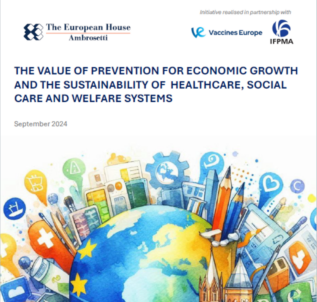Interview with Laetitia Bigger, IFPMA vaccine expert on GVIRF 2014
The Industry Contribution to Global Vaccine & Immunization Research Forum
Interview with Laetitia Bigger, IFPMA senior manager for vaccines
Some 10 representatives from the pharma industry ̶ developers of vaccines ̶ such as Crucell, GSK, Novartis, Pfizer, Sanofi, Sanofi Pasteur, will join more than 250 experts registered to attend the first ever global vaccine and immunization research forum that will take place in Washington DC from 4-6 March 2014. Joining them is also IFPMA’s Laetitia Bigger1. She gives us her take on such Forum and what the pharma brings to the table.
What is at stake for the industry in such gathering?
LB: Our industry is highly committed to the Decade of Vaccines and the current robust pipeline of innovative vaccines proves it. Yet, we face many challenges in the development of high quality vaccines that we wish to tackle and discuss with key partners in this Forum, from policy makers, public sectors, product development partnerships (PDPs), multilateral organizations, academia and biotech. The vaccine journey remains complex, lengthy, arduous, expensive, and highly-risky. In view of the size of the challenges we face, we cannot do it on our own. Sharing risks and rewards is indeed essential in this field.
You mentioned that the journey is complex, why so?
LB: From a big pharma perspective, vaccines must compete with other pharmaceutical candidates in the pipeline because of limited resources. While companies engage in partnerships for the development of vaccines for neglected diseases for example, the return on investment in vaccines globally must justify the considerable capital investment required. In this particular field, investors are more conscious of the risks and uncertainty of investments. But regardless of such risks, the industry remains committed to work on a broad array of important vaccines that address significant public health problems in the developing countries.
A second element is that, to start with, it is a pretty well-established fact that the process that translates an idea to an approved new vaccine is long, arduous, and expensive, taking anywhere from 8 – 18.5 years and an estimated cost of development of $200 million to $900 million, according to the biomedical R&D guide that was issued in 2006. We need to juggle with ever increasing timelines for clinical development, demanding regulatory environments in multiple regions, manage rigorous safety monitoring and fully substantiate the claim that the candidate vaccine is fit for humans. Once approved, we need to add another 2.5 years to the manufacturing process with hundreds of manufacturing steps, hundreds of quality tests, half a ton of raw materials, with more than 1500 employees involved in multiple manufacturing sites.
Finally, we must ensure the sustainability of our products by further improving the vaccine (e.g. quality, clinical performance, safety information), meeting evolving stringent regulatory requirements and enhancing manufacturing processes to consistently supply millions of doses per year, with rigorous parameters of quality and potency.
It is a complex journey but it’s worth it as the positive impact vaccines have is huge.
So, more concretely, what has pharma brought to the table in terms of innovative R&D?
LB: The global health community has at its disposal the means to reduce the burden of cervical cancer, pneumonia, meningitis and rotavirus diseases. Since 2000, and within the GAVI Alliance, 288 million children have been immunized, saving the lives of an estimated 5.3 million children. This is a big success story, which is only achievable through partnerships. That said, we know that much remains to be done and that new vaccines are direly needed to prevent big killers such as malaria, tuberculosis along with many other neglected diseases like sleeping sickness, dengue or river blindness.
Today, we have over 200 vaccines in the pipeline, targeting 50 preventable-diseases including neglected tropical diseases. So the future is full of promise, especially if we can find better ways to remove the obstacles along the way. [Infographic vax R&D2013].
[1] Laetitia Bigger joined IFPMA in 2006 and is responsible for vaccines policy and anti-doping cooperation. She coordinated IFPMA activities related to regulatory policy – clinical trial transparency, ethics in medical research and pediatric medicines – and technical standards for innovative medicines, until December 2011. Prior to joining IFPMA, she worked as clinical research associate for the multidisciplinary center on oncology, University Hospital Lausanne. She holds a PhD degree in Biology from the University of Lausanne (Switzerland).
About IFPMA
IFPMA represents the innovative pharmaceutical industry at the international level, engaging in official relations with the United Nations and multilateral organizations. Our vision is to ensure that scientific progress translates into the next generation of medicines and vaccines that deliver a healthier future for people everywhere.
ifpma.org
To achieve this, we act as a trusted partner, bringing our members' expertise to champion pharmaceutical innovation, drive policy that supports the research, development, and delivery of health technologies, and create sustainable solutions that advance global health.




